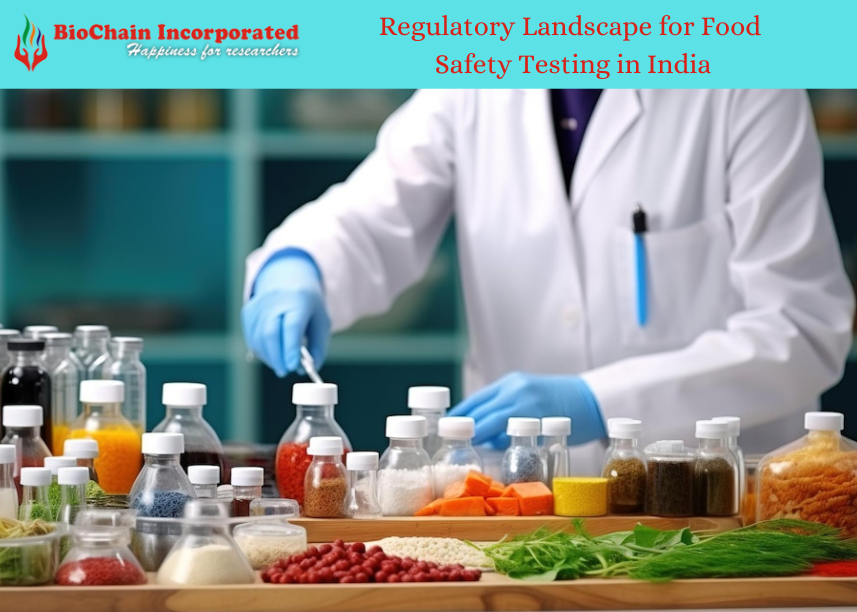Regulatory Landscape for Food Safety Testing in India
Ensuring food safety is of utmost importance to governments, businesses and consumers. In India, where many cuisines and culinary traditions thrive, maintaining high food safety standards is critical to protecting public health and building consumer confidence. To achieve this goal, strict regulations and testing protocols are in place across the country to control food and quality. We delve into the regulatory environment for food safety testing in India and explore measures to ensure the country's food safety. Biochain provides quality Food safety rapid test kit for better testing for food safety in India.
Know about food safety testing
Food safety testing plays an important role in ensuring the quality and safety of food. By analyzing food samples for contaminants, pathogens, chemical residues and other hazards, food safety testing helps identify potential public health risks and prevent foodborne illnesses. From farms and food factories to restaurants and supermarkets, strict testing protocols exist to monitor and maintain food integrity at every stage of the supply chain. With advanced testing techniques and strict regulations, stakeholders in the food industry can reduce risks, meet quality standards and ensure consumer confidence in the safety of the food they consume.
1. Food Safety and Standards Authority of India:
(FSSAI):
The Food Safety and Standards Authority of India (FSSAI) is the apex regulatory body responsible for ensuring food safety and regulating the food industry in India. Established in 2006 under the Food Safety and Standardization Act, FSSAI sets standards for food, regulates its production, storage, distribution, sale and import to ensure compliance with food safety and quality requirements.
2. Food Safety and Standards (Laboratory and Sample Analysis) Regulations:
FSSAI has prepared comprehensive regulations on food testing laboratories and sample analysis procedures. These regulations define the accreditation criteria, proficiency testing programs, testing methods, test methods and reporting standards for testing laboratories to ensure accurate and reliable results.
3. Mandatory Testing Requirements:
Under the Food and Standards (Food Standards and Dietary Supplements) Regulations, 2011, FSSAI imposes mandatory testing requirements for various food products to ensure compliance with safety and quality standards. These requirements include testing for microbiological contaminants, chemical residues, heavy metals, pesticides, additives and degradation products to identify potential hazards and reduce risks to public health.
4. Accredited Testing Laboratories:
FSSAI mandates that all testing laboratories involved in mandatory testing must be accredited by the National Accreditation Board for Testing and Calibration Laboratories (NABL) or any other accreditation body approved by FSSAI. Accredited laboratories must follow strict quality management systems and testing protocols to ensure the accuracy, reliability and traceability of test results.
5. Rapid Testing Methods and Technologies:
As technology advances, rapid testing methods such as immunoassays, biosensors and molecular techniques are increasingly used for food safety testing in India. These innovative approaches enable faster detection of contaminants, pathogens and harmful substances, enabling timely intervention and reducing food safety risks.
6. Monitoring and Enforcement:
FSSAI conducts regular monitoring and inspection activities to monitor compliance with food safety rules throughout the food supply chain. Failure to comply with regulatory requirements may result in enforcement actions such as recall of products, suspension or revocation of licenses, fines or legal action to ensure accountability and deterrence.
Conclusion
In conclusion, the regulatory environment for food safety testing in India is robust and constantly evolving to meet new challenges and protect public health. Through strict regulations, accredited testing laboratories, mandatory testing requirements and monitoring mechanisms, FSSAI is committed to maintaining the highest food safety standards and ensuring the integrity and quality of the country's food supply. By following these rules and investing in advanced testing technologies, food industry stakeholders can contribute to a safer and more sustainable food system for all. Biochian is considered as one of the leading Food safety rapid test kit suppliers in india. Contact now.



.png)

.png)


.png)
.png)
.png)
.png)
.png)